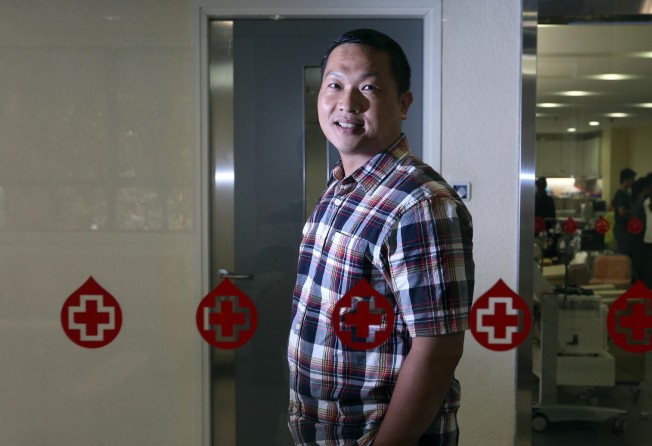Generous Hong Kong blood and bone marrow donor passes on his habits to his children
Compassion Ambassador nominee has given blood 256 times and donated bone marrow twice

When police officer Chan Kwong-hing's daughter turned 16, he took her to a blood donation centre - so she could make her first donation.
"Oh, she did get plenty of other birthday presents as well," he explains, but he was keen to pass on the community spirit to the next generation.
Mr Chan has been donating blood for 29 years - doing it a staggering 256 times.
"When my daughter, Maggie Chan [Yuen-ching], was very young, I used to bring her with me" to the Hong Kong Red Cross Blood Transfusion Service in Yau Ma Tei.
"So she was very comfortable with it and not afraid ... Now she's a habitual blood donor and donates blood once every four months," the police officer says.
At the centre, people lie on reclining chairs as they give blood. The donors tend to be younger and therefore quite fit, says Dr Lee Cheuk-kwong, a consultant for transfusion and transplant medicine at the service. So he asks many of them whether they are also willing to be bone marrow donors.
Chan, 46, who oversees police transport at the West Kowloon regional headquarters, has donated bone marrow twice.
The first time was on Christmas Eve in 2004. Chan was put under general anaesthetic and during a 40-minute procedure the bone marrow stem cells, which are mostly accessible near the pelvis, were extracted using a long needle.
"It wasn't that painful," says Chan, "and soon after I was back at work."
Bone marrow is primarily used as a last resort for people with conditions such as leukaemia, for whom drug treatments have not been successful, Lee says. But it's exceptionally difficult to find a match. The first port of call are relatives, where one in four can often find a match. Patients can then turn to the Hong Kong Bone Marrow Donor Registry to see if there is a match.
Preliminary tests are carried out and then the donor is contacted to provide a bit of bone marrow, but the chances of a match can be as low as one in 5,000 or more.
Chan was initially able to help one patient, who then had a relapse in 2007, so he helped her again, this time with a different process, Lee says. The second procedure is less invasive, if a bit tiring. The donor has a needle inserted in his arm for four hours to extract bone marrow stem cells.
Lee and Chan have been friends for a long time, says Lee, who laughingly chides Chan for having put on a bit of weight, which he needs to lose to be in prime condition to donate blood. "I do go hiking as a hobby," says Chan of his general fitness.
Chan has been nominated by Lee and the Hong Kong Red Cross for the Compassion Ambassador Award for this year's Spirit of Hong Kong Awards, organised by the South China Morning Post.
Chan is keen to emphasise that the small pain felt on making a bone marrow donation "is I think less than people think it's going to be".
His son will soon turn 16 and will be making his first blood donation on his birthday, Chan says.